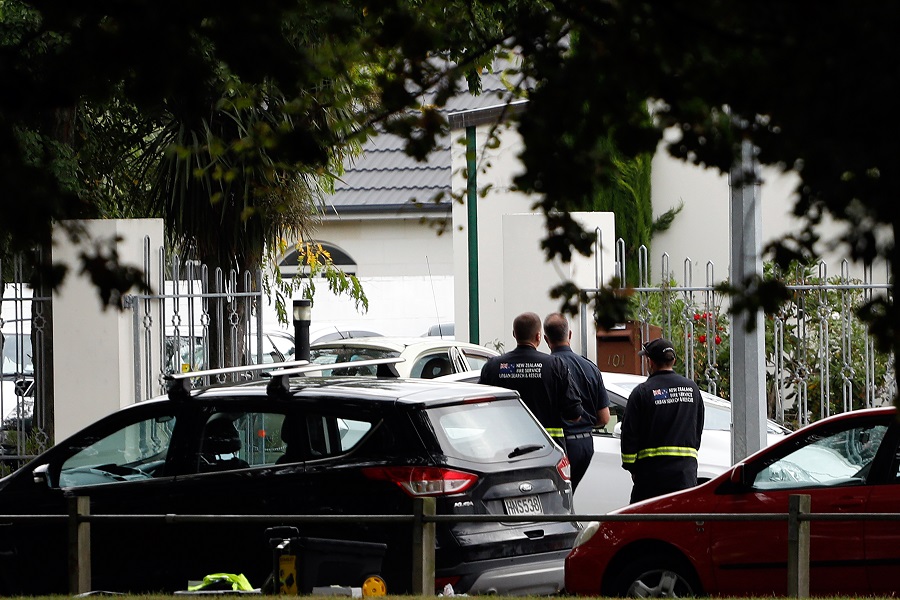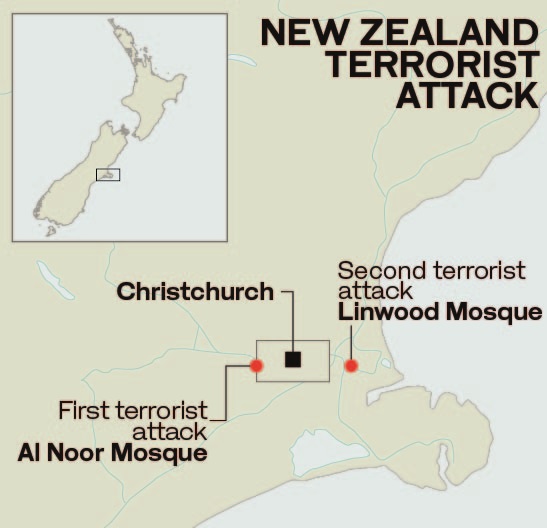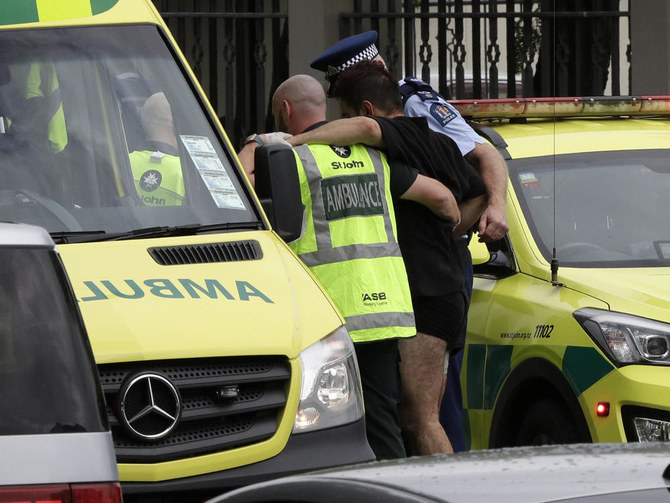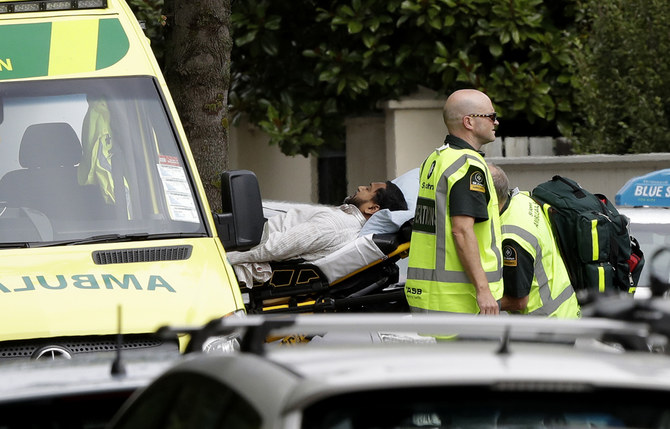CHRISTCHURCH, New Zealand: At least 49 people, including children, were killed, and 50 others critically injured in mass shootings at two mosques in the city of Christchurch on Friday, which are being described as “terrorist attacks.”
“This is one of New Zealand's darkest days,” said Prime Minister Jacidna Ardern. "Clearly what has happened here is an extraordinary and unprecedented act of violence.”
New Zealand police detained three men and a woman, with one of them being charged with murder. Police also defused explosive devices in a car.
One of four people detained in New Zealand after mass shootings at two mosques in Christchurch is Australian, Australian Prime Minister Scott Morrison said.
“I can confirm that the individual who was taken into custody I have been advised is an Australian-born citizen,” he told reporters in Sydney.
“As family members with our New Zealand cousins today, we grieve, we are shocked, we are appalled, we are outraged, and we stand here and condemn absolutely the attack that occurred today by an extremist, right-wing, violent terrorist.”
#UPDATE: A segment of the New Zealand shooter’s livestream of the Christchurch mosque shootings - Arab News cut the video for being too graphic, details of what follows here: https://t.co/JdL8OucyAs pic.twitter.com/6oWCOllpRG
— Arab News (@arabnews) March 15, 2019
Video footage widely circulated on social media, apparently taken by a gunman and posted online live as the attack unfolded, showed him driving to one mosque, entering it and shooting randomly at people inside.
The video, which was cut as it was deemed too graphic, went on to show the shooter gunning down worshippers through the halls of the mosque, before reaching the main prayer hall.
The shooter fired at groups of worshippers huddled on at the corners of the room, as one man attempted to stop the shooter but only succeeded in knocking the gunman down before being shot.

Security officials walk outside the Masjid al Noor mosque after a shooting incident in Christchurch on March 15, 2019. (AFP/Tessa Burrows)
New Zealand's threat level had been raised to “high” in response to the deadly terror attack.
“We have lifted our threat level from low to high,” Ardern said, adding that three people had been detained who were not on extremist watch lists.
“We have tightened our response from our agencies at the border, at the airports. In fact, at every level, we have a heightened response.”
"It is clear that this can now only be described as a terrorist attack."
New Zealand Prime Minister Jacinda Ardern speaks after confirming 40 people have been killed in shootings at two mosques in the city of Christchurch: https://t.co/1BrW3kZqw9 pic.twitter.com/r23XzR7s5q
— CNN (@CNN) March 15, 2019
Witnesses told media that a man dressed in a military-style, camouflage outfit, and carrying an automatic rifle had started randomly shooting people in the Al Noor mosque.
Mazhar Syad Ahmed who witnessed the whole tragedy told Arab News: “It was a normal day, I was praying Linwood mosque before we heard the gunshots, I was lucky enough to run to a small store room before the shooter got inside the mosque and started shooting people.”
“I witnessed him from inside the small room, he was wearing full body-armed and he started shooting to kill 10 people before someone jumped on him forcing the shooter to leave his gun and run away, it took almost 10min before the police arrived but the shooter has already escaped, and bodies were thrown all over the mosque. This was one of my worst days ever.”
Mazhar added that “It is a peaceful city, we never had any such incident, people are very friendly and kind toward the Muslims and all other religions.
The New Zealand Herald reported there was a second shooting at the Linwood Masjid in suburban Linwood.

A man who lives near the Masjid Al Noor mosque in central Christchurch said many people were dead there. A witness to a second shooting told New Zealand media he saw two wounded people being transported by rescuers afterward.
Witness Len Peneha said he saw a man dressed in black enter the Masjid Al Noor mosque at about 1:45 p.m. and then heard dozens of shots, followed by people running from the mosque in terror.
Read more: Muslim world reacts at New Zealand terrorist attacks on mosque
Peneha, who lives next door to the mosque, said the gunman ran out of the mosque, dropped what appeared to be a semi-automatic weapon in Peneha’s driveway, and fled.
Peneha said he then went into the mosque to try and help.

This image taken from the alleged shooter's video, which was filmed Friday, March 15, 2019, shows him as he drives and he looks over to three guns on the passenger side of his vehicle in New Zealand. (AP)
“I saw dead people everywhere. There were three in the hallway, at the door leading into the mosque, and people inside the mosque,” he said. “It’s unbelievable nutty. I don’t understand how anyone could do this to these people, to anyone. It’s ridiculous.”
He said he helped about five people recover in his home. He said one was slightly injured.
“I’ve lived next door to this mosque for about five years and the people are great, they’re very friendly,” he said. “I just don’t understand it.”
He said the gunman was white and was wearing a helmet with some kind of device on top, giving him a military-type appearance.
Read more: Two Saudi citizens injured in New Zealand terrorist attacks
Mark Nichols told the Herald he heard about five gunshots and that a Friday prayer goer returned fire with a rifle or shotgun. Nichols said he saw two injured people being carried out on stretchers past his automotive shop and that both people appeared to be alive.
Radio New Zealand quoted a witness inside the mosque saying he heard shots fired and at least four people were lying on the ground and “there was blood everywhere.”
“Horrified to hear of Christchurch mosque shootings. There is never a justification for that sort of hatred,” said Amy Adams, a member of parliament from Christchurch.
Two Saudi citizens were among those injured in the terrorist attacks on Al Noor mosque in New Zealand’s Christchurch, according to an official statement from the Kingdom’s embassy in Wellington.
Read more: One Jordanian dead, two among those critically injured in New Zealand terrorist attacks
Palestinian sources have indicated that a number of Palestinians were amongst the victims of the New Zealand terrorist attacks.
The Jordanian Foreign Ministry said that one Jordanian was killed and 7 wounded in the New Zealand terrorist attack.
A Jordanian barber identified as Wasseim Alsati and his daughter were among those injured in the attacks.
The Bangladesh cricket team arrived in Christchurch on Friday to play New Zealand in a third cricket test that was due to start on Saturday but has now been cancelled.

This image taken from the alleged shooter's video, which was filmed Friday, March 15, 2019, guns on the passenger side of his vehicle in New Zealand. (AP)
"They were on the bus, which was just pulling up to the mosque when the shooting begun,” Mario Villavarayen, strength and conditioning coach of the Bangladesh cricket team, told Reuters in a message. "They are shaken but good.”
Muslims account for just over 1 percent of New Zealand's population, a 2013 census showed.
"Many of those who would have been affected by this shooting may be migrants to New Zealand," Ardern said.
"They may even be refugees here. They have chosen to make New Zealand their home and it is their home ... they are us. The persons who has perpetuated this violence against us ... have no place in New Zealand."
New Zealand historically has had only a handful of mass shootings events.
Bangladesh team narrowly avoid mosque shooting, test called off
The Bangladesh cricket team narrowly avoided being caught up in the shooting and forced the cancellation of a test match against hosts New Zealand.
The team were on a bus that was approaching the Al Noor mosque for Friday prayers on the eve of the third test at nearby Hagley Oval when the shooting began.
Mario Villavarayen, the team's strength and conditioning coach, said it had been a close call.
“They were on the bus, which was just pulling up to the mosque when the shooting begun,” he told Reuters via Twitter.
“They are at the ground, they are shaken but good.”
The team were pictured on social media walking back through Hagley Park to the cricket ground and a BCB spokesman later told Reuters the team were in lockdown at their hotel.
“All our players are now safe in their hotel which has been cordoned off,” the spokesman said. “We have advised the players not to step out.
“Importantly, our players are safe.”
New Zealand Cricket said they had chosen to cancel the test, which was the final match of the tour, after discussions with the Bangladesh board.
“I spoke to my counterpart in Bangladesh and we agree it's inappropriate to play cricket at this time,” chief executive David White told TVNZ.
“It's quite unbelievable really. We are shocked.”
White said he had spoken to the liaison officer with the Bangladesh team and the players were “shocked”.
Opening batsman Tamim Iqbal said on Twitter the experience had been “frightening”.
“Entire team got saved from active shooters!!! Frightening experience and please keep us in your prayers,” he wrote.
Mushfiqur Rahim, who missed the first two tests through injury, said the team had been fortunate to avoid the shooting.
“We are extremely lucky,” Mushfiqur said. “...never want to see this things happen again....pray for us.”
(With AP, AFP, Reuters)





























